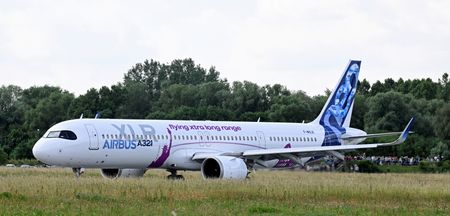By David Shepardson and Tim Hepher
WASHINGTON/PARIS (Reuters) -The U.S. Federal Aviation Administration said it has approved special conditions for the Airbus A321XLR after concerns were raised that a novel type of fuel tank could pose fire risks in its newest narrow-body jet.
Rival planemaker Boeing told European regulators in 2021 the architecture of a fuel tank intended to increase the A321XLR’s range “presents many potential hazards”.
The FAA said in a filing seen by Reuters that it will require that the lower half of the A321XLR fuselage, spanning the longitudinal area of the tank, be resistant to fire penetration to protect passengers.
The FAA publication provides further clarity surrounding the development of the new jet, whose introduction has been delayed to 2024.
Industry sources say proposed delivery schedules of the longer-range single-aisle jet have been left in a state of flux while regulators pondered how to treat the novel design.
“While discussions with the airworthiness authorities are still ongoing, we are not in a position to comment during the public consultation period,” an Airbus spokesperson said.
Entry-to-service remains scheduled for the second quarter of 2024, the spokesperson added.
Airbus shares were up by around 1.3% in Thursday morning trade.
The FAA said the special conditions are needed because the new Airbus twin-engine plane includes an extra fuel tank moulded into the airplane fuselage rather than in its wings.
The tank is in an area of the lower fuselage that partially replaces the rear cargo compartment of earlier aircraft designs.
The FAA said existing rules for post-crash fire protections had not anticipated this type of design and special conditions were “necessary to establish a level of safety equivalent to that established by the existing airworthiness standards.”
In May, Airbus delayed the entry of service of its newest model to early 2024 from late 2023 as a result of the regulatory review, and in October it postponed the date to the second quarter of 2024.
CEO Guillaume Faury said in October the planemaker hoped it had a stabilised schedule for coming quarters, but industry sources have said airlines have been kept waiting.
Analysts say design changes imposed by regulators could trim the plane’s range, one of its main selling points, but Airbus reiterated there were would be no significant impact.
The European Union Aviation Safety Agency was not immediately available to comment.
(Reporting by David Shepardson in Washington and Tim Hepher in Paris; editing by Lincoln Feast and Jason Neely)

